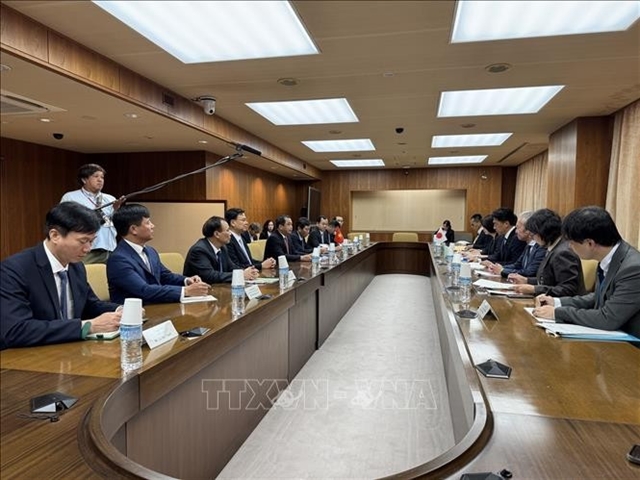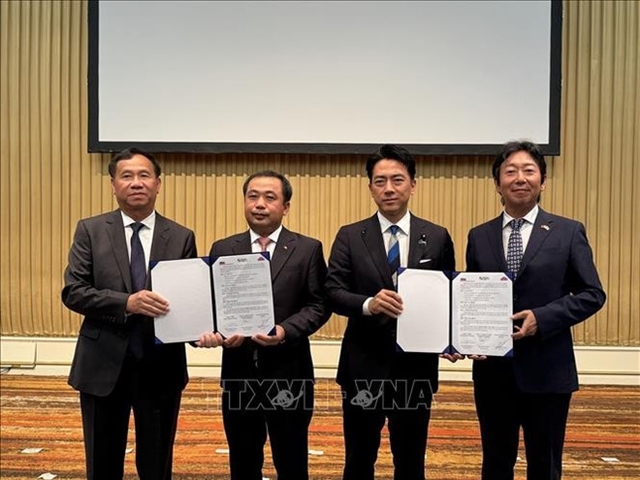 Economy
Economy
.jpg)
 |
| Delegates at the event. — VNA/VNS Photo |
TOKYO — The sixth Việt Nam - Japan high-level agricultural cooperation dialogue convened in Tokyo on Thursday, with Acting Vietnamese Minister of Agriculture and Environment Trần Đức Thắng and Japanese Minister of Agriculture, Forestry and Fisheries Koizumi Shinjiro charting a course for enhanced collaboration in agriculture, forestry, and fisheries.
The two officials approved the third phase of the Việt Nam-Japan medium-to-long-term vision for agricultural cooperation.
Thang praised Japan as a strategic partner, not only for its capital and technology but also for management experience sharing and effective public-private partnership models. He said programmes under the vision bolster Việt Nam’s agricultural value chains, improving product quality, expanding export markets and advancing sustainable, green growth goals.
To unlock further potential, Thắng urged Japan to open its market to more Vietnamese products like pomelos, passion fruit and catfish.
Both sides agreed to ramp up scientific-technological collaboration, focusing on seed research, biotechnology, post-harvest preservation and the transfer of cutting-edge tools such as the Internet of Things (IoT), artificial intelligence (AI) and blockchain.
Koizumi expressed enthusiasm for broader agricultural ties and invited Việt Nam to the 2027 World Horticultural Exhibition in Yokohama. He also pushed for faster progress on market access for Japanese products, including pomelos, grapes, and pufferfish.
On the same day, the Việt Nam-Japan public-private dialogue on agricultural cooperation, hosted by the Japanese Ministry of Agriculture, Forestry and Fisheries, drew nearly 200 business leaders from both nations.
 |
| At a MoU exchange ceremony. — VNA/VNS Photo |
Thắng encouraged Japanese firms to boost investment in deep processing and sustainable agricultural value chains, spotlighting shared benefits and risk sharing models.
Koizumi, for his part, said public–private partnership between Japan and Việt Nam has created valuable models, serving as examples for the Association of Southeast Asian Nations (ASEAN) and the world.
Under the ministers’ witness, 10 memoranda of understanding on business, trade, and investment were signed between Vietnamese and Japanese companies.
Business leaders from both sides showcased their strengths and proposed ideas to deepen cooperation across sectors, aiming to build sustainable food systems through technologies that reduce greenhouse gas emissions, ease environmental burdens and increase productivity.
Within the framework of the forum, the PAN Group signed a cooperation agreement with two Japanese partners – AGRI SMILE and Mitsubishi Research Institute (MRI) – to promote sustainable organic farming.
Under the agreement, the partners will conduct field trials on rice crops to assess the nutrient absorption and climate resilience of biostimulant products developed by AGRI SMILE. At the same time, they will prepare registration dossiers and market distribution plans for these products in Vietnam.
Biostimulants are biological preparations applied to crops or soil to stimulate natural physiological processes. They enhance nutrient uptake, improve tolerance to stress (such as heat, drought, salinity, and pests), and boost both yield and quality. Unlike traditional fertilisers, which provide nutrients directly or pesticides, which control pests, biostimulants work by improving plant health and resilience.
They are often derived from natural sources such as seaweed extracts, amino acids, beneficial microorganisms, humic and fulvic acids or recycled agricultural and food by-products.
At a time when Vietnam is moving to reduce chemical fertiliser and pesticide use and to develop greener agriculture, biostimulants are emerging as a suitable and promising solution. They help strengthen crop health, improve nutrient efficiency, and enhance resilience against climate change challenges such as drought, salinity, and extreme heat. Staple crops like rice, maize, and vegetables are expected to benefit greatly from their application.
Speaking on the sidelines of the forum, Nguyễn Thị Trà My, CEO of PAN Group, said: “Japan is not only an important partner for many Vietnamese enterprises but also a market that validates product quality.
"Cooperation in Japan brings tremendous value for PAN Group, as 30 per cent of our export revenue comes from this market. It is proof that only high-quality Vietnamese products can succeed in such a demanding environment.” VNA/VNS
.jpg)



